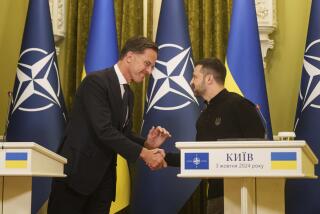NATO Signs Accord With Ukraine
MADRID — Further updating the security map of Europe, NATO on Wednesday signed a partnership pact with Ukraine, the continent’s second-largest country--and one that for centuries lived in fealty to its bigger and more powerful Russian neighbor.
The pact came on the heels of NATO’s May 27 accord to form a joint consultative council with Russia and Tuesday’s decision here to invite three of the Western alliance’s former enemies--the Czech Republic, Hungary and Poland--to become full-fledged NATO members by 1999.
Leaders of the 16-member North Atlantic Treaty Organization, wrapping up their two-day summit here, joined Ukrainian President Leonid D. Kuchma to sign the charter establishing a “distinctive partnership” with Ukraine.
The charter calls for regular consultation and cooperation between NATO and Ukraine on a host of issues from civil emergency planning and defense to nuclear safety, a prime concern in the nation that was home to the 1986 Chernobyl catastrophe. In addition, it explicitly pledges alliance support for Ukraine’s “territorial integrity,” words that may inflame Russian ultranationalists who yearn for the return to Russian control of the Crimean peninsula, currently part of Ukraine.
President Clinton called the pact with the former Soviet republic another step toward a “new, undivided and democratic Europe.”
“May the charter we sign today be just the opening stage in a long history of unity, partnership and peace that NATO and Ukraine will write together,” Clinton said.
*
Before the ink on the agreement was dry, French President Jacques Chirac shocked U.S. policymakers by declaring that his country will not pay a single franc more to NATO to help defray the costs of eastward expansion, which the Pentagon estimates at more than $27 billion over the next 13 years.
Chirac indicated that Poland, Hungary and the Czech Republic should themselves assume the bulk of the expenses of upgrading their militaries to meet NATO standards.
A Pentagon study estimated that the new members would bear about half the total cost, but it said existing members should pay the rest. The costs will cover new weaponry to update aging arsenals, new military infrastructure and measures to integrate the three countries into the alliance’s command and communications structures. The U.S. study said Washington’s share would be no more than $200 million a year.
The Congressional Budget Office estimated the total cost of expansion at $60 billion, again with the new members paying about half.
Chirac said expansion of the alliance should not increase costs at all because NATO, facing no immediate military threat, no longer needs to arm itself to repulse a multi-echelon, tank-led invasion from a Soviet-led Eastern Bloc. “Enlargement . . . should take place at zero cost and by redeployment of spending,” Chirac said.
Saying he simply didn’t believe some U.S. estimates, the French president implied that American arms manufacturers are bidding up the price tag of a bigger NATO by trying to sell costly new weaponry to the emerging democracies in Central and Eastern Europe.
*
Robert E. Hunter, U.S. ambassador to NATO, predicted that France--which like many European countries is beset by high unemployment and an economy in the doldrums and must hold down spending to qualify for the planned single European currency--eventually would pay its share of the expansion costs.
“I’m confident that at the end of the day, all countries that agreed to bring the new countries in will agree to spend the money necessary to do that,” Hunter told reporters.
NATO Secretary-General Javier Solana said the alliance has not yet begun its own cost estimate.
Chirac clashed with Clinton on Tuesday by demanding that the alliance add Romania and Slovenia as well as the three nations supported by the United States. Clinton sought a smaller expansion, in part to hold down costs.
Already chafing from the alliance’s decision to expand eastward, Russian President Boris N. Yeltsin and his aides are expected to pay rapt attention to NATO’s dealings with Ukraine.
Russia put a brave face on the Ukraine pact on Wednesday. Gennady N. Seleznyov, chairman of the Duma, the lower house of the Russian parliament, said Ukraine is “a sovereign country surrounded by NATO member states and it must take care of its security.” But he said any attempts by NATO to draw former Soviet republics into membership would result in Russia’s canceling its own pact with NATO.
Russian analyst Pavel Felgengauer, military commentator for the daily newspaper Sevodnya, scoffed at both Ukraine’s charter and Russia’s own, similar deal with NATO.
“If the document between NATO and Russia is largely conceded as just a piece of paper, then the charter between NATO and Ukraine is nothing more than a third copy of this piece of paper,” Felgengauer said.
Kuchma said Wednesday that the NATO-Ukraine accord demonstrates the West’s acceptance of Ukraine, which has broken free of Moscow’s tutelage only since opting for independence in December 1991, as “an equal member of the community of Eastern and Central European countries.”
His government has joined peacekeeping operations in Bosnia-Herzegovina and has pledged 30 police officers to the U.N. International Police Task Force working in the former Yugoslav federation.
Vanora Bennett of The Times’ Moscow Bureau contributed to this report.
More to Read
Sign up for Essential California
The most important California stories and recommendations in your inbox every morning.
You may occasionally receive promotional content from the Los Angeles Times.










